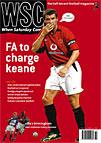 After the collapse of ITV digital, Simon Tindall believes that Division One clubs are acting fast to betray all those below them, without doing themselves any particular favours either
After the collapse of ITV digital, Simon Tindall believes that Division One clubs are acting fast to betray all those below them, without doing themselves any particular favours either
The latest plan for restructuring the Football League is now up for discussion. A report from management consultants KPMG, commissioned by the First Division clubs, is now being circulated to the Second and Third Division. The gist of its contents was made public in August, and when the lower division clubs get their hands on the full version they are not likely to find it attractive reading.
In the mid-summer panic over ITV Digital the First Division clubs made it clear to the League that they wanted to assume almost complete control over its operation. That sentiment is faithfully reflected in the report, which recommends that they should have a controlling 75 per cent of the vote on issues put to all 72 member clubs, and that they should keep at least 80 per cent of the League’s income.
There might be the odd incentive or parachute payment to smooth the way, but predictably a report which consulted only First Division clubs strongly reflects their desires. Its suggested division of power and income may seem unfair, but it is at least a practical proposal. Much more nebulous is the promise that a new “Division One Brand” will pull the same trick that the creation of the Premier League did ten years ago and become an inspiring focus for the League as a whole.
There are several differences between the two situations that should be obvious. The first is that in 1992 the Premiership was aggressively marketed by Sky, who had to recoup what they had gambled on the expensive new contract, whereas today’s First Division has no such shared interest with a TV station.
Second, there is as much grime as there is glamour in the First Division. The report assumes a common interest and “brand status” between, to take extremes, Wolves and Rotherham (it’s usually Grimsby, but we’ll give them a break) but not between Wolves and Cardiff, or Bristol City. Yet there is nothing permanent, even if you are Wolves, about your status in any division, so it’s like trying to brand a place on an escalator. This truth appears to have escaped even the men who run clubs such as Walsall and Watford – Second Division members within very recent memory – who have been among those pressing for more power to be given to the First.
Third, the Premiership has a clear and easily marketed status as the top flight of English football. What, by contrast, is the “inner brand truth” of the First Division? Perhaps something like: “Medium-sized, provincial cities of intermediate footballing status, desperate to escape the brand of which they are an integral part.” That’s not an easy sell. A more worthwhile task would a successful rebranding of the Football League to benefit the whole of full-time professional football outside the Premiership.
As befits accountants talking to desperate chairmen and chief executives, the report focuses on commercial and financial objectives. It is trying hard to exploit the “value” in football without understanding where it comes from. Missing is any mention of what some more fan-oriented observers are beginning to call the “ecology” of the game – how all the different levels fit together for the benefit of the whole. Other notable omissions are any reference to League structures in other countries, reforms in other UK sports’ structures or even the continuing rise in attendances.
Traditionalists can take comfort from the rejection, at least for now, of some of the wilder flights of fancy (Brighton v Celtic etc) that have crossed the back pages in recent months. What the First Division clubs propose is to be done within the existing divisional structure. The report also recommends the creation of a Board whose members are independent of the clubs, rather than chairmen, as now. On the face of it this would seem a good move, creating a leadership that is more stable (currently representatives have to quit if their team is relegated or promoted) and more able to take a longer-term, objective view.
However, the effect of these proposals, should they be implemented, would be to diminish the status of a lot of clubs and the game, probably unnecessarily. A new four-month consultation is now set to take place, commissioned by the League as a whole, which will this time seek the views of the Second and Third Divisions, the FA, the PFA and the Premier League (though not the fans). Those wider terms of reference at least show a glimmer of awareness that the word “league” means “agreement for mutual help”.
From WSC 188 October 2002. What was happening this month